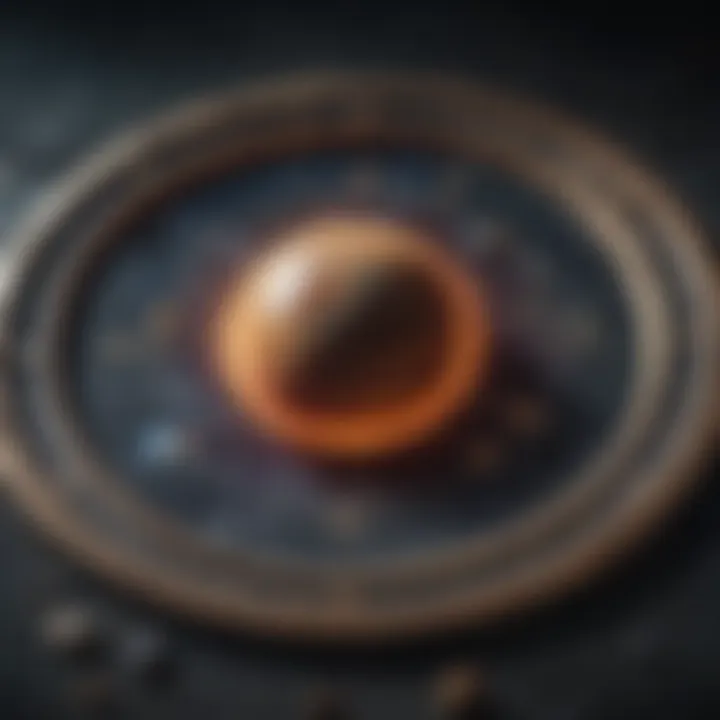Discovering Your Zodiac Planets: A Comprehensive Guide


Intro
Understanding zodiac planets is crucial for anyone interested in astrology. These celestial bodies influence our traits and experiences, shaping our lives in complex ways. By uncovering your zodiac planets, you gain deeper introspection, enabling you to navigate your life's challenges more effectively.
Zodiac Sign Overview
Understanding your zodiac sign is the first step in discovering your zodiac planets. Each sign encapsulates a range of general traits that help frame your personality.
General Traits
Every zodiac sign possesses unique characteristics. For instance, Aries is known for its assertiveness, while Pisces embodies sensitivity. Recognizing these traits allows you to appreciate how they intersect with your planetary influences.
Element and Modality
Each zodiac sign is also categorized under an element and modality. The four elements are:
- Fire
- Earth
- Air
- Water
The modalities, including Cardinal, Fixed, and Mutable, further refine how each sign expresses its core traits. Understanding these connections can help contextualize your zodiac planets’ influences.
Strengths and Weaknesses
Every zodiac sign has inherent strengths and weaknesses. Knowing these aspects can enable personal growth. For example, Capricorns may exhibit great discipline but can struggle with rigidity. Recognizing these dichotomies helps you work on areas of improvement while leveraging your strengths.
Detailed Horoscope Analysis
A detailed horoscope analysis provides greater clarity on your zodiac planets’ placements and their implications.
Daily Horoscope Breakdown
Daily horoscopes serve as a snapshot of how planetary positions affect your day-to-day life. These insights can range from emotional states to potential challenges or opportunities. Regularly checking your daily horoscope can keep you informed of subtle shifts in planetary energies.
Weekly and Monthly Predictions
Expanding beyond daily analysis, weekly and monthly predictions offer a broader perspective on upcoming influences. Astrologers often identify key planetary alignments that will be significant during these periods. Understanding these can offer guidance on when to take risks or exercise caution.
Key Planetary Influences
Each planet represents different aspects of your personality and life events. For example, Venus relates to love and relationships, while Mars signifies action and assertiveness. By exploring these influences, you can identify which planets resonate more strongly within your birth chart.
Astrology for Personal Growth
Astrology can serve as a tool for personal development by fostering a deeper understanding of oneself.
Understanding Birth Charts
Your birth chart maps the positions of the planets at the exact moment of your birth. This chart is a crucial tool for examining your zodiac planets and their specific influences. Online resources and astrology apps allow you to create detailed birth charts and interpret them effectively.
Tips for Embracing One's Zodiac Traits
Embracing your zodiac traits can enrich your life. Here are some strategies:
- Reflect on your innate strengths and use them in decision-making.
- Work on weaknesses through conscious effort.
- Surround yourself with supportive individuals who complement your zodiac traits.
Astrological Practices to Enhance Life
Consider integrating astrological practices, such as meditation based on your zodiac sign or journaling to track your emotional states aligned with planetary movements. These activities ground your understanding of astrology in practical, daily life.
Understanding your zodiac planets is not just an intellectual exercise; it is a pathway to personal insight and transformation.
In summary, unfolding the layers of your zodiac planets begins with understanding your zodiac sign itself, analyzing your horoscope regularly, and engaging in practices that align with your astrological insights. This guide aims to empower astrology enthusiasts to enhance their personal development journey effectively.
Foreword to Zodiac Planets
Understanding your zodiac planets is a foundational step in astrology. The concept of zodiac planets sheds light on various aspects of your personality and influences your life experiences. By examining these celestial bodies, you can gain insights into your motivations, emotional responses, and areas for growth. This article serves as a detailed guide, helping you navigate this astrological landscape.
The significance of zodiac planets extends beyond mere curiosity. They reflect the energies that shape your reality and provide a personalized roadmap for self-discovery. Exploring these planets serves multiple purposes:
- Self-awareness: Knowing your zodiac planets fosters a deeper understanding of your traits and behaviors.
- Personal growth: You can identify strengths and weaknesses, which aids in personal development.
- Life decisions: Understanding these astrological influences helps make informed choices in various life areas.
In summarizing this introduction, we underscore the importance of zodiac planets in weaving the complex tapestry of individual astrology.
What Are Zodiac Planets?


Zodiac planets include the Sun, Moon, and the five traditional planets: Mercury, Venus, Mars, Jupiter, and Saturn, as well as Uranus, Neptune, and Pluto. Each of these planets represents different energies and aspects of human life. For instance, the Sun embodies one's core identity and vitality. The Moon reflects emotions and the inner self. Each planet operates synchronously within the astrological chart to influence personal traits and behaviors.
The Importance of Zodiac Planets in Astrology
The study of zodiac planets is integral to astrology as it defines the characteristics of each zodiac sign. Each planet's position at the time of your birth affects your life profoundly. Zodiac planets are used as a lens to interpret various life events, both major and minor. Their influence can be pivotal in personal relationships, career paths, and emotional well-being.
Understanding these influences connects you to a larger universal cycle. It aligns you with celestial movements that shaped human experience throughout history. In essence, zodiac planets are not just distant bodies in the universe; they are critical to personal and collective experience in an ever-evolving astrological framework.
Understanding Your Birth Chart
When exploring the realm of astrology, understanding your birth chart is vital. A birth chart serves as a celestial snapshot of the sky at the moment you were born. This chart is a map that reveals the positions of the planets and their relationships to one another. Knowing how to read and interpret this chart helps individuals grasp the influence of zodiac planets on their personality and life experiences.
Understanding your birth chart provides clarity. It connects you to the cosmic elements affecting daily life. This knowledge can illuminate specific patterns and tendencies within your personality. Separating aspects of the chart reduces the complexity, allowing you to explore personal growth that aligns with your astrological markers.
Components of a Birth Chart
A birth chart comprises several key components, which all interrelate. The sun, moon, and rising signs are foundational elements. Each represents different facets of life and personality. The sun sign indicates core identity and ego, the moon correlates with emotions and instincts, and the rising sign reflects external personality and first impressions.
The planets also play a significant role. Each planet symbolizes various aspects of our lives:
- Mercury governs communication and intellect.
- Venus influences love and aesthetics.
- Mars dictates drive and passion.
- Jupiter relates to expansion and luck.
- Saturn rules discipline and structure.
- Uranus brings change and innovation.
- Neptune connects to dreams and intuition.
- Pluto signifies transformation and power.
- Chiron reflects healing and wounds in relationships.
- Black Moon Lilith represents the darker feminine aspects.
In addition to these, the aspects, which are the angles formed between planets, indicate relationships that can influence how energy flows within your chart. Understanding these components offers a more comprehensive view of your astrological influences.
Identifying Planets in Your Birth Chart
Identifying the planets in your birth chart involves accessing accurate astrological software or resources. Many websites offer detailed charts for free or for a small fee. Usually, you need to input your birth date, time, and location. The exactness of the time is crucial. Even a few minutes can shift the positions of important elements.
Once you have your chart, finding the planets requires examining the chart's layout. The chart displays various symbols representing each planet. Each symbol corresponds to specific characteristics or influences in your life:
- Circle with a dot (☉) for the Sun
- Crescent (☽) for the Moon
- Mercury symbol (☿)
- Venus symbol (♀)
- Mars symbol (♂)
- Jupiter symbol (♃)
- Saturn symbol (♄)
- Uranus symbol (♅)
- Neptune symbol (♆)
- Pluto symbol (♇)
Understanding where these planets are positioned in your birth chart adds depth to your self-analysis. Their locations within zodiac signs and houses provide context on how they influence your life events and personality traits.
Identifying and understanding your planets is an essential step in unlocking insights about your true self and life's journey.
How to Calculate Your Zodiac Planets
Understanding how to calculate your zodiac planets is vital for anyone interested in astrology. This process offers insights into the subtle astrological influences that shape our personality and experiences. In this section, we will address the essential steps involved in calculating zodiac planets, emphasizing the benefits and considerations that can enhance your astrological knowledge.
Gathering Required Information
To begin calculating your zodiac planets, certain information is essential. You need your birth date, exact time of your birth, and the location of your birth. Each of these elements plays a critical role in ensuring the accuracy of your calculations. Without precise details, your birth chart may not reflect the true alignments of celestial bodies at the time of your birth.
For example:
- Birth Date: Ensure you've recorded the full date, including the year.
- Birth Time: If possible, seek documentation like a birth certificate to obtain the exact time.
- Birth Location: This could be as specific as the city and country of your birth.
Collecting this information accurately will lay a solid foundation for subsequent steps in the process. Without it, interpreting your zodiac planets may lead to confusion or misrepresentation.
Using Online Astrology Calculators
In today’s digital age, several online astrology calculators simplify the process of calculating zodiac planets. Websites like Astrodienst and AstroSeek offer user-friendly platforms that assist you in generating your birth chart quickly. Typically, these tools require the same information mentioned in the previous section. Once you input the data, the calculator will display your unique birth chart alongside the positions of your zodiac planets.
Using these calculators can save time and effort compared to manual calculations. The results often include interpretations, which can further facilitate your understanding of how these planetary positions impact your life. However, it’s essential to choose a reliable source to avoid any errors in calculations.
Manual Calculation Techniques
Manual calculation of zodiac planets can be a rigorous yet rewarding process. It requires a basic understanding of astronomy and mathematical skills. Here are the essential steps involved:
- Obtain an Ephemeris: This astronomical chart lists the positions of celestial bodies for each day of the year. You will need the ephemeris for your birth year.
- Calculate the Local Sidereal Time: Local sidereal time helps determine the zodiac rising sign and planetary positions. This involves converting your local time to Greenwich Mean Time, considering daylight savings if applicable.
- Determine Planetary Positions: Using the ephemeris, locate the positions of planets based on the sidereal time. Write down the zodiac sign each planet occupies and their degrees within those signs.
- Create Your Birth Chart: Draw the zodiac wheel and place the planets in their corresponding positions. This will provide a visual representation of your astrological makeup.
While manual calculations demand patience and diligence, they can deepen your understanding of how each planet influences various aspects of your life.
Analyzing Your Zodiac Planets
Analyzing your zodiac planets is critical for understanding the deeper layers of your astrological identity. This process reveals how various celestial influences shape your personality, motivations, and interactions with others. Instead of viewing your zodiac sign in isolation, in-depth analysis provides a more comprehensive understanding of how each planet interacts within your chart and affects different aspects of your life.
Understanding the role of each planet is not only insightful but also can be significantly beneficial for personal growth. When you grasp the specific traits and energies associated with each planet, you can identify areas in your life that may need attention or adjustment. Analyzing your zodiac planets helps uncover strengths to lean into and weaknesses to address.
Additionally, the consideration of planetary aspects—how planets relate to one another within the chart—is crucial. These relationships can reveal conflicts or harmony that shape your experiences. Thus, a thorough analysis of your zodiac planets yields more than mere traits; it provides powerful insights into life patterns.
Interpreting the Role of Each Planet


Each planet embodies distinct characteristics that resonate with various aspects of human experience. The exploration of these roles is crucial for a holistic understanding of your birth chart. For instance, the Sun relates to identity and self-expression, while the Moon connects to emotions and inner life. It is important to note that the significance of each planet differs, depending on its position in your chart.
When interpreting the role of each planet, consider the following:
- Sun: Represents core identity, purpose, and drive.
- Moon: Governs emotions, instincts, and subconscious drives.
- Mercury: Rules communication, thinking, and learning styles.
- Venus: Embodies love, beauty, and relationship dynamics.
- Mars: Reflects energy, action, and assertiveness.
- Jupiter: Connects with growth, luck, and expansion.
- Saturn: Represents discipline, authority, and structure.
- Uranus: Ties to innovation, originality, and rebel spirit.
- Neptune: Links with intuition, dreams, and spirituality.
- Pluto: Reflects transformation, power, and regeneration.
- Chiron: Stands for healing, especially of past wounds.
- Black Moon Lilith: Embodies repressed feminine energy and intuition.
Understanding these roles enhances not only your self-awareness but also your interpersonal relations and personal journey.
Planetary Positions and Their Meanings
The positions of planets in your birth chart provide essential context to their respective roles. Each planet occupies a specific sign and house that affects how their energies are manifested. For example, if your Sun is in Aries and in the fifth house, it suggests a fiery personality with a strong inclination towards creativity and self-expression. Conversely, a Sun in Capricorn in the second house might indicate a grounded identity focused on material success and stability.
Here are key components to consider when examining planetary positions:
- Sign: Determines the character and nature of the planet's energy.
- House: Indicates the area of life affected by the planet's influence.
- Aspects: Define relationships between planets and modify their energies.
Aspects can be harmonious or challenging and greatly affect how energies blend or conflict. Analyzing these elements offers insights into life themes and challenges.
The Influence of Aspects Between Planets
Aspects are crucial in interpreting how different planetary energies affect one another. They reveal complexities in your birth chart and help you understand the dynamic connections between planets. For example, a harmonious aspect, like a trine, indicates ease and flow while a square suggests tension or obstacles.
When evaluating aspects, consider the following:
- Conjunction: Planets are close together, blending energies intensively.
- Sextile: Offers opportunities and support for growth between planets.
- Square: Creates challenges and requires effort to harmonize energies.
- Trine: Facilitates ease and cooperation between planetary influences.
- Opposition: Highlights polarization between energies, requiring balance.
Analyzing these aspects refines your understanding of how internal conflicts or strengths manifest, guiding you toward better life choices and personal evolution.
Understanding your zodiac planets and their interactions is a profound journey that can significantly impact your self-awareness and life path.
The Twelve Zodiac Planets and Their Significance
Understanding the twelve zodiac planets sheds light on the complex interplay of celestial influences shaping personality and life experiences. Each of these planets embodies distinct energies and attributes that manifest in various ways, guiding individuals through their personal journeys. Knowing these planets helps deepen your astrological understanding, enhancing self-awareness and personal growth. In this section, we dive into each of the zodiac planets, revealing their significance and impact on our lives.
The Sun: Core Identity and Vitality
The Sun represents the core identity of an individual. It encapsulates one's fundamental essence and personal vitality. The sign in which the Sun is located during one's birth is often regarded as the “Zodiac sign,” influencing how an individual perceives themselves and how others perceive them. Understanding the Sun's position provides insight into your core motivations, desires, and creativity.
The Moon: Emotions and Inner Self
The Moon governs emotions and the subconscious. It reflects how individuals relate to their feelings and the emotional responses they exhibit. The Moon's placement is crucial for understanding one's inner self and intuitive instincts. A person with a prominent Moon influence might display a rich emotional life, often swayed by past experiences and deep-seated feelings.
Mercury: Communication and Thought Processing
Mercury is known as the planet of communication and thought processing. It rules how individuals express their ideas and convey thoughts to others. Its placement in a birth chart defines one's intellectual style, decision-making process, and relationships with others. A strong Mercury position often indicates quick thinking and adaptability, while a weaker position might lead to misunderstandings.
Venus: Love and Beauty
Venus symbolizes love, beauty, and attraction. This planet shows how individuals express affection and what they find aesthetically pleasing. The Venus placement can indicate relationship dynamics, values concerning love, and even financial decisions. Understanding this planet helps in navigating personal connections and appreciating beauty in various forms.
Mars: Action and Drive
Mars embodies action, energy, and assertiveness. It is the driving force behind ambition and the pursuit of desires. A strong Mars position often correlates with determination, while a weak position might lead to indecision or passivity. Knowing where Mars falls in your chart can illuminate your approach to challenges and accomplishments.
Jupiter: Growth and Expansion
Jupiter is associated with growth, expansion, and optimism. It signifies areas in which an individual seeks knowledge, adventure, and potential for abundance. A well-placed Jupiter often correlates with good fortune and a sense of purpose. It helps one to identify opportunities for personal growth and exploration of possibilities in their life.
Saturn: Structure and Discipline
Saturn represents structure, discipline, and responsibility. It is often seen as the teacher of hard lessons and boundaries. The placement of Saturn in a birth chart highlights areas of life where individuals may encounter obstacles or be required to develop perseverance. Understanding Saturn's influence can foster resilience and a sense of responsibility.
Uranus: Innovation and Change
Uranus signifies innovation, originality, and sudden changes. It encourages thinking outside the box and embracing the unconventional. When Uranus is a prominent influence, individuals may feel more driven to challenge norms and seek unique paths. Learning about Uranus can help individuals navigate their desires for freedom and individuality.
Neptune: Intuition and Imagination
Neptune governs intuition, dreams, and the ethereal realm. It is linked to creativity and spiritual pursuits. The placement of Neptune can reveal how individuals connect with their imagination and intuition, as well as any potential escapism tendencies. Understanding this planet encourages exploration of inner realms and deeper connections.
Pluto: Transformation and Power
Pluto represents transformation, power, and regeneration. It embodies the cycles of death and rebirth, hinting at profound changes individuals may undergo throughout their lives. Pluto's placement in the birth chart can indicate areas of intense focus and strength, revealing paths of transformation and personal empowerment.


Chiron: Wounded Healer
Chiron is known as the Wounded Healer. It represents deep emotional wounds and the potential for healing through experience. Its placement in a chart reveals where an individual may have insecurities but also where they can develop resilience. Chiron encourages embracing one's pain to foster a deeper understanding of healing and compassion.
Black Moon Lilith: Embracing the Feminine Shadow
Black Moon Lilith symbolizes the feminine shadow, representing repressed aspects of femininity and empowerment. It highlights the importance of embracing and integrating these hidden qualities. Understanding this influence encourages individuals to confront their deeper emotions and reclaim personal power, specifically in the context of feminine energy.
Each of the twelve zodiac planets brings unique influences that shape our personalities and experiences. Understanding these planets aids in personal growth and self-awareness.
By reflecting on the placement of these planets within your birth chart, you can better grasp the complex layers of your astrological identity, paving the way for deeper self-discovery.
Exploring Planetary Retrogrades
Understanding planetary retrogrades is crucial in the study of zodiac planets. Retrogrades are periods when planets appear to move backward in the sky, an optical illusion that holds significant meaning in astrology. This phenomena can intensify a planet's influence, challenge our perceptions, and prompt reflection. Knowing how to interpret these periods can enhance your understanding of your astrological influences. Each retrograde phase serves as an opportunity for personal growth, introspection, and reassessment of certain aspects of life.
What Are Retrogrades?
In astrology, a retrograde occurs when a planet seems to move in reverse relative to the Earth. This happens due to the differing speeds of the planets' orbits. For example, when Earth moves faster than an outer planet like Saturn, it can create the appearance that Saturn is moving backward.
Typically, each planet has a few retrograde periods throughout the year, lasting from several weeks to months. During these times, the planet's energy may manifest in unexpected ways. Retrogrades often prompt a focus on past experiences. Aspects of life linked to the retrograding planet might surface, leading to the need for reassessment or renewal.
How Retrogrades Affect Zodiac Planets
Retrogrades can have a profound effect on how the energies of the zodiac planets are felt. Here are some key considerations:
- Revisit Themes: The retrograde phase encourages a revisitation of themes associated with the planet involved. For instance, during a Mercury retrograde, communication and technology issues may arise, causing misunderstandings.
- Reevaluating Relationships: Venus retrogrades often lead to reflection on love and relationships. Past partners might reappear in one's life or prompt rethinking about current relationships.
- Emotional Healing: When Mars is retrograde, individuals might find themselves reassessing their goals and drives, often igniting tensions but also fueling personal growth.
- Impact on Personal Plans: The general feeling during retrogrades can often bring delays or frustrations in areas governed by the affected planet, urging patience and evaluation before proceeding with significant decisions.
It is essential to approach these times with an open mind, embracing the lessons they bring. Awareness of retrogrades allows individuals to harness their energies for personal development, making them an integral part of understanding zodiac planets.
Practical Applications of Zodiac Planets
Understanding the practical applications of zodiac planets enhances the relevance of astrology in everyday life. It goes beyond mere curiosity and provides frameworks for personal development, relationships, and career choices. Zodiac planets are more than astrological symbols; they are tools for self-discovery and growth. In this section, we explore how these celestial influences can be effectively applied.
Using Zodiac Planets for Personal Growth
Zodiac planets can significantly aid personal growth. Each planet represents different aspects of life and personality. For instance, Mercury influences communication, while Jupiter symbolizes growth. By understanding which planets are prominent in one's birth chart, an individual can identify their strengths and areas for improvement.
To utilize these insights, individuals may consider the following steps:
- Self-Reflection: Analyze personal traits and behaviors related to each significant planet in your chart.
- Set Goals: Use this knowledge to create tangible personal goals that align with these planetary influences.
- Adaptation: Recognize when planetary transits may affect your current endeavors. Adjust your approach accordingly.
Utilizing zodiac planets fosters a greater self-awareness. Many find clarity in their actions, leading to more meaningful experiences.
Zodiac Planets in Relationship Compatibility
Zodiac planets also play a crucial role in understanding relationship dynamics. Each celestial body brings unique energies that influence how individuals connect with others. Compatibility is not solely based on sun signs; the positions of Venus, Mars, and the Moon are equally important.
For better relationship insights, consider these aspects:
- Analyzing Venus: Represents love and affection. Its position reveals how one approaches relationships.
- Mars Influence: Governs passion and conflict. Understanding Mars can help navigate arguments or disagreements.
- Moon’s Role: Reflects emotional needs. Knowing where the Moon is positioned can aid in understanding emotional compatibility.
Incompatibilities may arise from certain planetary positions, but awareness of these factors can facilitate communication and understanding. A deeper comprehension of planetary influences helps couples to address challenges with empathy.
Impacts on Career and Life Path
Astrology can provide critical insights into one's career choices and life path. Zodiac planets can elucidate innate skills and tendencies that might not be immediately obvious. For example, Saturn relates to discipline and structure, aiding in professions that require organization, whereas Jupiter's expansive nature may point toward roles that involve growth and opportunity.
To determine how to apply this knowledge, consider these actions:
- Identify Influential Planets: Review your birth chart to see which planets dominate your career-related houses.
- Align Career Interests: Choose career paths that resonate with your zodiac planets’ influences.
- Recognize Timing: Be aware of planetary retrogrades or transits that could affect career decisions.
As you navigate your professional landscape, these insights can shape a fulfilling career aligned with your astrological predispositions.
Understanding your zodiac planets is a way to understand yourself better, leading to more informed choices in personal and professional realms.
End
The conclusion serves as a vital point of synthesis in understanding zodiac planets. It not only wraps up the insights gained throughout the article but also reinforces the importance of this astrological knowledge. By knowing your zodiac planets, you gain a clearer picture of your personality and life patterns. This awareness can guide you in personal development and relationships, enhancing self-understanding and helping you navigate challenges.
Summary of Key Points
In summary, the article discussed various essential themes:
- Definition of Zodiac Planets: These celestial bodies play significant roles in shaping your astrological identity.
- Calculating Your Zodiac Planets: By gathering personal data and utilizing calculators or manual techniques, you can discover your unique planets.
- Analyzing the Influence of Planets: Each planet's role, its position, and relationships can deeply impact various aspects of life.
- Applications of Zodiac Planets: The insights gained can foster personal growth and improve relationship dynamics. Understanding these points can provide a foundation for a practical approach to astrology.
Encouraging Further Exploration
Astrology is a vast field, and there is always more to learn. As you delve deeper into your zodiac planets, consider exploring different methodologies such as synastry for relationship compatibility or transits for understanding the timing of events in your life. Engage with community resources like forums on reddit.com or social media groups dedicated to astrology. Such connections can enrich your astrological practice and foster dialogue with likeminded enthusiasts. The journey of discovery does not need to stop here—there are continuously new aspects to uncover within the cosmic tapestry.







